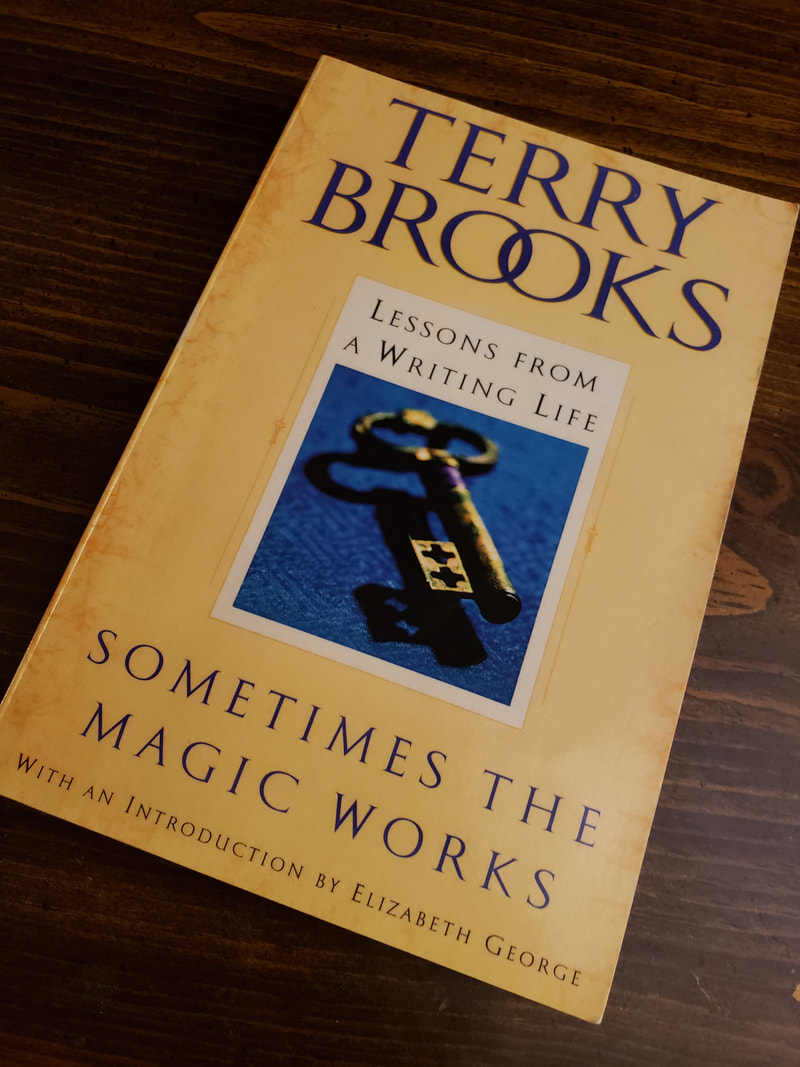ON THE ORIGIN OF CHARACTERS An interesting question came to me in a conversation with a friend. That is, the conundrum of “Where do story characters come from?” I say that it is interesting because I quite candidly don’t know the answer. The arrival of a character is almost as enigmatic as the character is themselves. Characters are, in a materialist’s opinion, figments of the imagination. They are merely creations of the engine of the mind put forth for the writer’s use in a story. But we know that’s not all there is to it, though the above opinion is partially correct, of course. But it is not wholly correct. Characters are human; they are just as human as you or I. They have personalities; they have quirks and nuances; they laugh, and they cry. And most human of all, they possess the most remarkable resilience. But their origins are unknown. Perhaps they are mere figments, ghosts of the psyche that are conjured for the very purpose of slaving to a plot. Or maybe they are a stroke of providence, a unique piece of “somewhere else” (if you believe there is somewhere out there that one could consider “else”). Of course, both explanations seem fitting on a philosophical spectrum, I believe there is more to it than that, and my beliefs come from a particular part of my writing process. I do not brainstorm characters. Honestly, I rarely research name meanings to fit a character’s personality. Though there is no correct way to make or name a character (just as there is no correct way to write a story), I personally believe this takes away the sense of organism that the character possesses in my mind. So, what do I do when I need a new character, you might ask? Well, I’m a bit careless. I clear my mind and simply ask: “What’s your name?” Photo by William F. Burk It’s curious to me how I will always get an answer. Of course, I have planned characters, but most are happy surprises. And because of this, I cannot say that they are mere figments for a story. Many of them don’t have a story yet. And as for providence, I don’t believe any of them are given to me. No. Characters are something entirely other. Perhaps they are real? And I believe I love the mystery of it. They are blessings to the writer. They teach us; they surprise us; they show us the beauty in the world when they overcome adversity. They are unique and wondrous little voices that speak to our hearts and minds… And I wouldn’t have it any other way. Happy writing. Thanks for reading! For more writings by me, visit the "My Writings" page!
0 Comments
If anything in your life is more important than writing—anything at all—you should walk away now while you still can. Forewarned is forearmed. For those who cannot or will not walk away, you need only remember this. Writing is life. Breathe deeply of it. — Terry Brooks, “Sometimes the Magic Works: Lessons from a Writing Life A friend disagreed with me once about the blessings of art in contrast to the curses of the artist. It is a fascinating subject indeed. And those who are not a slave to the muses have difficulty understanding the yoke the artist wears around their neck. Art is the most beautiful burden, and that does not necessarily make it a bad thing. In a conversation with my wonderful editor on if writing my second book will be easier than the first, I replied that, for a writer, ease is the enemy. Ease is the sign that you have stopped; ease is the sign that you have become comfortable with your writing ability, and that—well--that is a most dangerous position to be. If you ever believe that writing is “easy,” you must know that you are simply fooling yourself: Danger! Danger! You must turn back! Side note: This is an amazing book. You should read it! So how do these two topics amalgamate? How does the burden of writing keep us from the dangers of ease? Burden is the sign of growth; hardship is the sign of progress. Triumph over burden means that your passion is true, and true passion is the crux of good Art. So, let me broaden the words of the great master above me... “[Art] is life. Breathe deeply of it.” Enjoyed this post? Found it helpful? Leave me a comment! :) “In the cave you fear to enter lies the treasure that you seek.” - Joseph Campbell There is a deepness and unsung clarity to this quote. Over the past few weeks, I have been reading Joseph Campbell’s magnum opus, “The Hero With A Thousand Faces,” and it is odd just how much this single book has caused me to grow as a writer and overall as a storyteller. I have always been a lover of stories; I have always believed in their power. They move us, teach us, and cause us to grow. Stories are inherently and inextricably human, and you probably couldn’t imagine your life without them. So what makes a story “human”? And just what does it mean for a story to be “human”? When you read a tale of heroism or extravagance, you might read this and think “How am I anything like this hero? They’re so larger than life!” And if I told you that these heroes are not so different from you or me, would you believe me? Would you believe me if I said that these heroes and heroines are all a part of the same archetype—the same human spirit and psyche? Photo by William F. Burk I must admit that, as a writer, I do. Stories are things that have the power to transcend the contrived boundaries between humanity and yet, deep within them, they hold the keys to our very essence. All peoples, when moved by a tale, will weep at its beauty. The above quote is a favorite of mine, simply because it captures the message of Campbell’s book so well, and I think it's so wise because often times we don't strive for the things we desire because we're afraid of failure. In a sense, our lives aren't so different from that of the hero who journeys into the cursed cave to find his sacred treasure. No. The heroes of myth and legend, in many ways, are not so different from us everyday people. While we will indeed never journey to obtain the Golden Fleece or wrestle the wild man Enkidu, we still have two things that the heroes of ancient tales possess: We have the fear of the unknown and the proclivity for courage. Indeed the unknown faces us, its visage abysmal and grim. We know that our desires lie within, but darkness is daunting, isn’t it? But with only a little courage does the hero solve the riddle, escape the trap, slay the beast. When one’s virtue supersedes their self-preservation, that is true courage. So, then, how are you like the heroes of ancient myth? Easily put, you are kin in that all humans struggle, and all humans possess desires, loves, romances. The heroes of ancient times may seem so alienated from the common day, but the truth is that they are not. The protagonists of these age old epics are merely hyperbolic archetypes of what it means to be human. Go, bravely into the cave, for there is thunder within you. How the Finding of the "Treasure" |
What is our "Hero's Journey"?
Thoughts on Joseph Campbell's "The Hero With A Thousand Faces"
The idea of the adventure of a hero is not one unique to the realms of myth and fairy tales. I am currently reading Joseph Campbell’s masterpiece, “The Hero With A Thousand Faces,” and I must admit that the profound nature of this book is eye-opening to say the least. Before opening the book, I would like to have believed that I understood the concept of a “Hero’s Journey” and what it entailed for characters in my books as they moved like chessmen across the board of space and time that is the plot of the story. And, now halfway through the book, I would also like to believe that I understand something more about stories.
And I would also like to believe that I have encountered something much more profound.
And I would also like to believe that I have encountered something much more profound.
The “Hero’s Journey” affects us all, whether in the vastness of one’s life completely, or in the smallness of going to the grocery store. And the reason for this, I believe, is because the idea of this Journey is rooted in our abilities to choose. Even when one rejects their destiny, the destruction they have wrought is their creation, and theirs alone.
The Journey is all around us, an omnipresent force which moves the gears of the clock of destiny to chime to the time of the hero to begin again and be born anew. But the bell tolls for all, not just Theseus, and humanity’s destiny (and the destiny of the individual) resides in their unique keenness to hear the chimes of the seemingly supernatural, all-encompassing, subconscious forces of the world and mind.
So how then is the common man akin to the man of myth?
The answer is rather simple, and the answer is this: you have the ability to choose. Think about your choices every day, for the clock is constantly ticking, awaiting to chime its beckon for one to be summoned to the destiny of their life. Or perhaps it merely chimes to the destiny of one’s day, one’s singular hour. Destiny is a fickle mistress in that, though she is a commander of paths, she lays in bed with the autonomy of Free Will.
So, watch your life. You may be surprised to find that your “Hero’s Journey” lies everywhere. No matter how large. No matter how small. Listen well, for the bells of adventure beckon merely for those who hear.
The Journey is all around us, an omnipresent force which moves the gears of the clock of destiny to chime to the time of the hero to begin again and be born anew. But the bell tolls for all, not just Theseus, and humanity’s destiny (and the destiny of the individual) resides in their unique keenness to hear the chimes of the seemingly supernatural, all-encompassing, subconscious forces of the world and mind.
So how then is the common man akin to the man of myth?
The answer is rather simple, and the answer is this: you have the ability to choose. Think about your choices every day, for the clock is constantly ticking, awaiting to chime its beckon for one to be summoned to the destiny of their life. Or perhaps it merely chimes to the destiny of one’s day, one’s singular hour. Destiny is a fickle mistress in that, though she is a commander of paths, she lays in bed with the autonomy of Free Will.
So, watch your life. You may be surprised to find that your “Hero’s Journey” lies everywhere. No matter how large. No matter how small. Listen well, for the bells of adventure beckon merely for those who hear.
The Writer as a Strategist
Though I am largely a fan of strategy games, I am not very good at chess. I studied chess for short while, but instead of improving in my knowledge of the game, the experience gave me a rather interesting insight into the world of writing. And, as I stand now, I fully believe that the art of crafting a story is a lot like the science of playing chess.
“How, Will?” You must ask. “How is telling a story anything akin to two players moving chess pieces vindictively across the rows and files of the chessboard?”
“How, Will?” You must ask. “How is telling a story anything akin to two players moving chess pieces vindictively across the rows and files of the chessboard?”
And the answer lies within the question, for all a story is composed of is two forces, two objects of willpower, making moves across a board in hopes for a victorious goal.
Sit with me here and imagine. Have you ever been writing an arc, a chapter, or a scene and stopped to think: “Why isn’t this working? Why am I not moving towards my desired goal?” And thus the writer, whether they know it or not, sits at the board, ogling the pieces before them, pondering as to why their decisions up until this point are not working, when in a sudden in a whirlwind of epiphany, they think “Of course! If I do this, then it will work!”
Just like that, the writer is no longer merely a spinner of ideas or characters, but a strategist of the storytelling art. As the same way a grandmaster moves his pieces to his designs, the writer places their characters to create certain effects. The characters dance upon the board—upon the plot in a magnificent play to move toward the end goal.
The writer desires the checkmate, or, the end of the story.
But how do they do this with so much against them? And who, then, is their opponent?
The opponent of the writer remains one object, be it the the World, the Psyche, the Self. The writer fights against the mind, in a glorious duel to uncover the World within.
And so, for every brilliant move, there is an equal counter-force. This, is the exact way that the story is like the chess match. The writer concocts his plot by moving their pieces to the common goal of finality, just as the grandmaster moves their pieces to the common goal of checkmate.
How does this—how should this—change our mentalities as writers?
Well, it’s rather simple. If we think more about the utility of our characters, we will see more about their quality to the plot and why they are important. Likewise, if we think of the plot less a series of events and more a strategy, it gives us the ability to take away the intimidation that it sometimes presents. After all, it is merely the concoction that results from our strategic decisions along the writer’s journey—the writer’s game. And lastly, if we think of our end goal as checkmate, it implies one thing particularly.
It implies that we must be aware of the goal (the ending) and thus it gives us a goal to play our pieces in favor of.
I have been thinking about this analogy much lately, and I believe it is a strange one, yet equally refreshing. And though the World, the Psyche, and the Self strike against us, we must know that the strategy is in our hands, and, as long as we can play our way to victory, the art is eternally free.
Sit with me here and imagine. Have you ever been writing an arc, a chapter, or a scene and stopped to think: “Why isn’t this working? Why am I not moving towards my desired goal?” And thus the writer, whether they know it or not, sits at the board, ogling the pieces before them, pondering as to why their decisions up until this point are not working, when in a sudden in a whirlwind of epiphany, they think “Of course! If I do this, then it will work!”
Just like that, the writer is no longer merely a spinner of ideas or characters, but a strategist of the storytelling art. As the same way a grandmaster moves his pieces to his designs, the writer places their characters to create certain effects. The characters dance upon the board—upon the plot in a magnificent play to move toward the end goal.
The writer desires the checkmate, or, the end of the story.
But how do they do this with so much against them? And who, then, is their opponent?
The opponent of the writer remains one object, be it the the World, the Psyche, the Self. The writer fights against the mind, in a glorious duel to uncover the World within.
And so, for every brilliant move, there is an equal counter-force. This, is the exact way that the story is like the chess match. The writer concocts his plot by moving their pieces to the common goal of finality, just as the grandmaster moves their pieces to the common goal of checkmate.
How does this—how should this—change our mentalities as writers?
Well, it’s rather simple. If we think more about the utility of our characters, we will see more about their quality to the plot and why they are important. Likewise, if we think of the plot less a series of events and more a strategy, it gives us the ability to take away the intimidation that it sometimes presents. After all, it is merely the concoction that results from our strategic decisions along the writer’s journey—the writer’s game. And lastly, if we think of our end goal as checkmate, it implies one thing particularly.
It implies that we must be aware of the goal (the ending) and thus it gives us a goal to play our pieces in favor of.
I have been thinking about this analogy much lately, and I believe it is a strange one, yet equally refreshing. And though the World, the Psyche, and the Self strike against us, we must know that the strategy is in our hands, and, as long as we can play our way to victory, the art is eternally free.
The Light of Fantasy
Illuminating the Magic Mirror
Fantasy contains an inherent contradiction. The genre is not as it appears, but its truth makes it exceedingly relevant. Fantasy is not a pure escape. While escapism is absolutely a facet of the genre, it is misleading to suppose that fantasy fully escapes the present world. It is, instead, a mirror. Fantasy, as a rule, must reflect the world in which we live. As hypocritical as this sounds, the writer then has a mission to make the fantastic seem mundane, the surreal seem real, the unbelievable seem believable. A writer is to spin a web of illusion and capture the human mind within its grasp. To bring the myth alive, one must bring it down from Olympus—from the realm of the gods—and place it within the finite minds of fragile mortals. In essence, fantasy must reflect the human condition.
That is the only way that a man could wrap his head around it.
This is not for no reason, however; it is not out of spite, nor of a sinister machination of the author. Within a fantasy story, there is a conscious and unconscious desire to confront the horrors of the world. Through fantasy, a reader (and the writer) is able to confront the despicable and the evil.
That is the only way that a man could wrap his head around it.
This is not for no reason, however; it is not out of spite, nor of a sinister machination of the author. Within a fantasy story, there is a conscious and unconscious desire to confront the horrors of the world. Through fantasy, a reader (and the writer) is able to confront the despicable and the evil.
Photo by William F. Burk
This is the thing that makes fantasy ever relevant. It is not merely the escape, but the reflection of the true magic in the world. It is the reflection of the human spirit and the miraculous desire for life to continue. It is in it's very essence a reminder that good can triumph and that there is still beauty worth fighting for. The glory of fantasy is that it attunes itself with the songs of our hearts and reminds us that there is something greater and far more powerful than despair, and that this power exists in each and every one of us—that we have the strength to overcome great adversity. There is light in the most pervasive darkness, and the greatest magic exists in the smallest of voices. Whether we know it or not, our greatest power against the evils of the world is but our mortal will to live that carves its path through the horrors around us. The reader sees themselves through the spyglass of the imagined world, and perhaps they discover through the tale that, though the world is vast and treacherous, there is light, and it is bright enough to illuminate the night.
THE WRITING MIND:
THE THREE TOOLS OF THE WRITER
Once I had drafted my first novel (which is currently in the revision stage), I felt rather proud of myself. I had set my mind to a project and actually followed through with it. Though I still never spoke about the accomplishment to anyone other than my friends or by a singular “I did it!” tweet on Twitter, the experience brought an unlikely revelation my way.
That is, I realized just how many people shared my goal and just how many people had story ideas exactly like I did.
Mankind is a creature intrinsically drawn to stories; stories exist in our everyday lives, our every moment. Actually, take this time to imagine a world without them. Yeah, sure, no one could write a book, but also, you could never talk about your day, either. You could never tell someone about a time when you were younger, or about a great grandfather that they will never meet. And, of course, you could never hear Karen complain about how she had to speak to the manager at McDonald’s. We as humans have the art of telling a tale bred into our souls, and life without them would be quite difficult (and perhaps unfathomable).
That is, I realized just how many people shared my goal and just how many people had story ideas exactly like I did.
Mankind is a creature intrinsically drawn to stories; stories exist in our everyday lives, our every moment. Actually, take this time to imagine a world without them. Yeah, sure, no one could write a book, but also, you could never talk about your day, either. You could never tell someone about a time when you were younger, or about a great grandfather that they will never meet. And, of course, you could never hear Karen complain about how she had to speak to the manager at McDonald’s. We as humans have the art of telling a tale bred into our souls, and life without them would be quite difficult (and perhaps unfathomable).
Photo by Morgan White
A friend asked me something the other day that I feel captures my ideology on this subject. He simply asked me “How do you write?” Though he himself is an aspiring songwriter and was mainly referring to poetry, the purpose of my message still stands. The thing is that, if you want to write——if you want to focus on telling stories or writing poetry——you must change your psychology. When I started writing, I thought a certain way, but now I don't think that way any more. The very way that my brain functions isn’t the same as it was when I began writing. As I said before, man is innately predisposed to storytelling; however, I do not believe that man is aware that he is such. It doesn't come immediately. Thankfully, you just have to work at it——and, I believe, anyone can. Stories exist all around us; they are a constant in nature and a product of the very flow of time itself. As long as things are able to change, there will always be stories to depict those changes; as long as conflict exists, there will always be stories of how they were resolved (both ending well and ending tragically). But the eye of the writer must be able to detect these subliminal clues; it must be able to point out the hints and determine where the story lies within them.
One of my favorite quotes, by William Faulkner, will do well here, I believe:
“A writer needs three things, experience, observation, and imagination, any two of which, at times any one of which, can supply the lack of the others.”
A writer indeed has those three tools: observation, experience, and imagination.
You must train yourself to be observant to little things. The world around us is begging to be seen in a different way; it is begging to be found as it is, and not as it is merely seen. Likewise, I read books all the time where a writer explains something so small in such a brilliant way. That's the Writer's Observation at work.
Experience is a bit more concrete. Experience is known, where observation is acquired. You can inherently write about what you know and have lived through, mainly because you are the only one who wields that perspective, and you are the only one who wields in that particular way.
Imagination is the strange one, mainly because it's abstract. Imagination is a mixture of wit and creativity. It's the place where a writer becomes an artist and twists things to his liking. In the hands of imagination, the universe is but a tool of the mind; it is but the hammer that collides onto the red-hot metal as the writer forms it into something brand new——some foreign mutation of what it once was.
None of these three are promised and sometimes they are merely given. All around us, there are things for us to say and things for us to hear. We must simply know when to speak and when to listen.
One of my favorite quotes, by William Faulkner, will do well here, I believe:
“A writer needs three things, experience, observation, and imagination, any two of which, at times any one of which, can supply the lack of the others.”
A writer indeed has those three tools: observation, experience, and imagination.
You must train yourself to be observant to little things. The world around us is begging to be seen in a different way; it is begging to be found as it is, and not as it is merely seen. Likewise, I read books all the time where a writer explains something so small in such a brilliant way. That's the Writer's Observation at work.
Experience is a bit more concrete. Experience is known, where observation is acquired. You can inherently write about what you know and have lived through, mainly because you are the only one who wields that perspective, and you are the only one who wields in that particular way.
Imagination is the strange one, mainly because it's abstract. Imagination is a mixture of wit and creativity. It's the place where a writer becomes an artist and twists things to his liking. In the hands of imagination, the universe is but a tool of the mind; it is but the hammer that collides onto the red-hot metal as the writer forms it into something brand new——some foreign mutation of what it once was.
None of these three are promised and sometimes they are merely given. All around us, there are things for us to say and things for us to hear. We must simply know when to speak and when to listen.
On Fantasy, the Escapist,
and Plato's Cave
As a writer, I found the foundation of my own style only recently. The fantasy genre is much more than merely stories about heroes, elves, and dwarves. As a genre, it includes a specific set of characteristics; as a form of literature, it represents a realization that wells deep from within the human condition. Fantasy——and fantasy, in particular——is the Escapist’s Genre.
The very rise of the fantasy genre sprouts from despair. For my example, consider Tolkien’s The Hobbit. Published in 1939, the classic tale of the adventure of Bilbo Baggins came onto shelves during the eve of what would quite considerably be the largest war known to humanity. More so, the story arrived merely two decades after what was, at the time, the greatest war the world had ever known. The world faced depression; the world stared into the mirror and perceived their own mortality.
And thus, people wished to find a way out——to another world, another time.
The very rise of the fantasy genre sprouts from despair. For my example, consider Tolkien’s The Hobbit. Published in 1939, the classic tale of the adventure of Bilbo Baggins came onto shelves during the eve of what would quite considerably be the largest war known to humanity. More so, the story arrived merely two decades after what was, at the time, the greatest war the world had ever known. The world faced depression; the world stared into the mirror and perceived their own mortality.
And thus, people wished to find a way out——to another world, another time.
To write fantasy is to seemingly write a paradox through a jagged spyglass. The world of the story must be unreal in some way. In contrast, it is the story’s realistic nature that captivates a reader. While the readers read to escape their surroundings, the readers secretly read to find themselves within the tale. So, while it is true that one wishes to leave the real world behind, it is just as true that one wishes to find shards of the real world in the place that the tale takes them to.
Along this vein of thought, the fantasy genre is comparable to Plato’s Analogy of the Cave. Imagine a person whom, throughout the entirety of his life, faced the back wall of a cave. And, as Plato puts it, there is a light that shines into the cave from the mouth, illuminating the back wall. People walk by the cave on the outside, casting shadows upon the wall for our prisoner to see. And, he sees nothing but these shadows. Given the only experience and knowledge he has perceived throughout his life, he would believe that these shadows are the “real” world and would not know that they are, in fact, merely the shadows of something else.
In certain aspects, fantasy stories follow this idea.
The writer creates a world, yet he can only make sense of it with what he knows and what he can fathom. One cannot write about something they do not cognitively perceive; creativity is only useful when it surfaces, not when it is dormant. So, then, the writer of fantasy, though crafty, must in some way or another cast shadows upon the wall for their reader (the chained man) to believe. This form of writing is, at its root, a type of trickery. It is a ploy by the hands of the writer, the Puller of Strings, to fool the reader into believing in the shadows: To make them care about non-existent characters, in non-existent places, doing non-existent things. With the reader always carefully in mind, the writer must piece together a mosaic of life and imagination, a collision of the real and the unreal. And therefore, as writers, we must watch the wall of the cave from the mouth, carefully observing the shadows that the world creates——and we must mold them to our liking.
Along this vein of thought, the fantasy genre is comparable to Plato’s Analogy of the Cave. Imagine a person whom, throughout the entirety of his life, faced the back wall of a cave. And, as Plato puts it, there is a light that shines into the cave from the mouth, illuminating the back wall. People walk by the cave on the outside, casting shadows upon the wall for our prisoner to see. And, he sees nothing but these shadows. Given the only experience and knowledge he has perceived throughout his life, he would believe that these shadows are the “real” world and would not know that they are, in fact, merely the shadows of something else.
In certain aspects, fantasy stories follow this idea.
The writer creates a world, yet he can only make sense of it with what he knows and what he can fathom. One cannot write about something they do not cognitively perceive; creativity is only useful when it surfaces, not when it is dormant. So, then, the writer of fantasy, though crafty, must in some way or another cast shadows upon the wall for their reader (the chained man) to believe. This form of writing is, at its root, a type of trickery. It is a ploy by the hands of the writer, the Puller of Strings, to fool the reader into believing in the shadows: To make them care about non-existent characters, in non-existent places, doing non-existent things. With the reader always carefully in mind, the writer must piece together a mosaic of life and imagination, a collision of the real and the unreal. And therefore, as writers, we must watch the wall of the cave from the mouth, carefully observing the shadows that the world creates——and we must mold them to our liking.
The Eternal Cafe:
At the Table of the World
Over the past few weeks, I have been going to the local Starbucks on a fairly consistent basis. Given that I have been stopping by for a drink quite often, I have become quite friendly with the majority of the employees. I enter the shop, order, then joke around with these people as they make my drink. To be completely candid, it is a bright part of my day. On my off days, I bring my computer and work on my stories. Sometimes employees on break will sit and talk with me for their short time.
This coffee shop experience is comparable to the endeavor of the writer. The journey of the writer takes place when one enters the “Eternal Cafe.”
The Eternal Cafe, however, is not a place one can reach on foot or by car. The Eternal Cafe is a state of mind. It is the mentality of the writer as he attempts to transcribe the words of the World. He enters the Cafe, and around him are people. They are but faceless phantoms, mixtures, entering and exiting the ethereal terminal. These phantoms will not speak unless the writer speaks first, but their faces appear, ever there, in his peripherals.
They all have a story to tell——but he lacks the time to tell them all.
The baristas work behind the bar, and the writer talks to them. As they converse, they tell the writer a story:
They give him a hint.
A quality.
A name.
A face.
These ghosts——these spirits——are what we call “characters.”
They embody us. They embody others. They embody themes.
They are the creations of our mind, molded from the World around us.
And that is what the writer has done, for the Eternal Cafe is but the sentience of the writer; it is his vigilance——his watchful eye. He is aware and catches the spirits as they go by; he is unaware and bumps into them. Some take hold and become people he knows quite well (if not completely), and some disappear——lost between the chasms of his mind, swept away by the muses.
The Eternal Cafe has only one table. One seat: The writer’s inevitable destination.
He sits at the table.
He must.
Beside him, is the Self: his heart, mind, soul, spirit. And, sitting lazily in front of him is the World——not the World as he sees it, but rather the World as it truly is. The conversation he has with this entity (whether we call it God or the Universe or whichever) is the essence of all true writing.
It is the purest form a writer can embody.
The Eternal Cafe has a plethora of entrances, each with a myriad of signs pointing us toward its doors. The World is ever before us; the phantoms ever walk our minds. We, as writers, must learn to perceive these things. For the single table beckons us, and the World has much to say.
This coffee shop experience is comparable to the endeavor of the writer. The journey of the writer takes place when one enters the “Eternal Cafe.”
The Eternal Cafe, however, is not a place one can reach on foot or by car. The Eternal Cafe is a state of mind. It is the mentality of the writer as he attempts to transcribe the words of the World. He enters the Cafe, and around him are people. They are but faceless phantoms, mixtures, entering and exiting the ethereal terminal. These phantoms will not speak unless the writer speaks first, but their faces appear, ever there, in his peripherals.
They all have a story to tell——but he lacks the time to tell them all.
The baristas work behind the bar, and the writer talks to them. As they converse, they tell the writer a story:
They give him a hint.
A quality.
A name.
A face.
These ghosts——these spirits——are what we call “characters.”
They embody us. They embody others. They embody themes.
They are the creations of our mind, molded from the World around us.
And that is what the writer has done, for the Eternal Cafe is but the sentience of the writer; it is his vigilance——his watchful eye. He is aware and catches the spirits as they go by; he is unaware and bumps into them. Some take hold and become people he knows quite well (if not completely), and some disappear——lost between the chasms of his mind, swept away by the muses.
The Eternal Cafe has only one table. One seat: The writer’s inevitable destination.
He sits at the table.
He must.
Beside him, is the Self: his heart, mind, soul, spirit. And, sitting lazily in front of him is the World——not the World as he sees it, but rather the World as it truly is. The conversation he has with this entity (whether we call it God or the Universe or whichever) is the essence of all true writing.
It is the purest form a writer can embody.
The Eternal Cafe has a plethora of entrances, each with a myriad of signs pointing us toward its doors. The World is ever before us; the phantoms ever walk our minds. We, as writers, must learn to perceive these things. For the single table beckons us, and the World has much to say.
Details
William F. Burk
Award-winning author of fantasy, flash fiction, and poetry. Author of "The Heart of Hearts," a debut fantasy novel. Always writing, forever and ever.
Archives
May 2024
October 2023
July 2023
June 2023
November 2022
March 2022
February 2022
December 2021
April 2021
March 2021
November 2020
October 2020
April 2020
November 2019
June 2019
April 2019
March 2019
February 2019
March 2017
August 2016
June 2016
Categories
All
Adventures
Bipolar Disorder
Book Reviews
Stories
Writing









 RSS Feed
RSS Feed